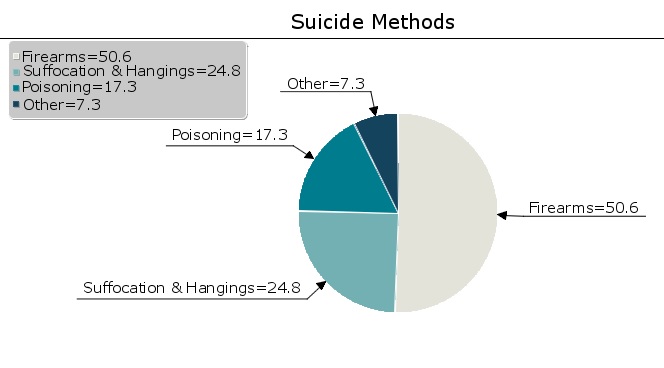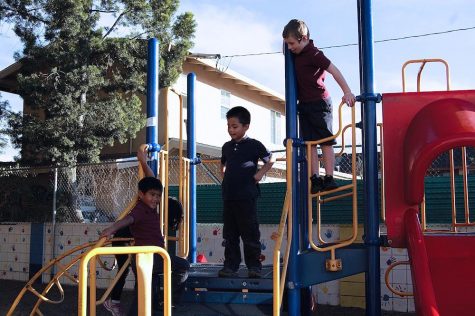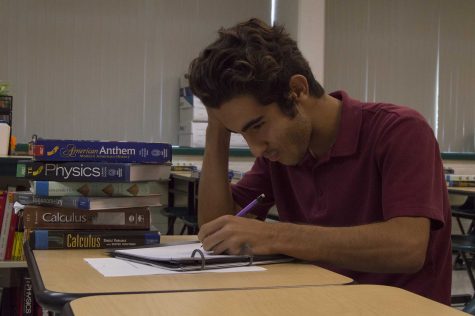Bottled-Up: Teen Suicide
According to Fierce Goodbye, a faith-based suicide prevention organization, suicide takes about 30,000 people every year in the United States, with someone ending their life every 17 minutes. With these drastic numbers, a group of adolescents formed a guidance group, in hopes of preventing suicide.
The guidance group began when a few of my friends from my church, as well as personal friends, attended a “hang out” about two years ago in Los Angeles. As we all spoke to each other, the conversations suddenly focused on depression and suicide.
Everyone was sharing their own personal thoughts or experiences about the subject. I personally shared my experiences, including how I had a personal blog where I would write about my thoughts on certain aspects of life. People on the Internet called it a “writing blog” or an “advice blog.”
One of my friends convinced me to post my reflections on suicide on my blog. And once I did, I started receiving suicidal messages from people who clearly needed my help. As I started answering each message, some anonymous some not, many people were attracted to my posts as well as my responses.
This encouraged my friends to make their own ways of helping with suicide. Some made blogs or other websites like mine, while others plainly give out their numbers or emails. From then on, we decided to call ourselves a guidance group.
I took part in this mainly because I know how it feels like to contemplate death. As some may call it, I had experienced my “breaking point.” It’s a state of mind where I couldn’t keep all my emotions inside anymore, so I broke down and dealt with all the pain at one terrifying time.
My friends are involved in the group for the same reasons. We also feel like life is too precious to give up so easily, when in reality, everything does get “better.” But at certain points of our lives, we fail to see that.
That is why we want to help people out of their blindness. If people, especially teenagers, gather enough courage to meet with some of us in person, we open our Los Angeles church to them. Other than that, it has come to a judgment that most people are comfortable speaking online. More specifically, they prefer to be known anonymously. This can be done through websites such as my own, www.ask.fm/hiaj, where people are free to send me messages anonymously or not.
Clark counselor Karine Turdjian, one of our school’s counselors, said she mostly receives anonymous tips about students who may be contemplating suicide. “Sometimes I receive anonymous notes from teachers, and we find out that way,” she stated. Ms. Turdjian said she recently attended a training about suicide prevention where she learned how to investigate such issues. “You have to act,” she said. “We never assume because it’s a personal state and you never know. But we never leave the student alone. We drop everything and immediately speak to them. We act on it and then investigate.”
When asked about why she thinks some teenagers are suicidal, she replied, “There are different reasons. Teenagers are really fragile. A small comment can trigger something drastically.”
With my own experience, I have come to known two people who failed their fight against suicide. Fortunately, I had the opportunity to talk 23 people out of it.
Among the 23, I have helped Kayla Marino (not her real name). She had always seemed so optimistic and joyful, but little did I know, she was in deep sadness. She spoke to me in person. I met her on the street where our old middle school was located.
Kayla felt more comfortable speaking to me near our old school, only because she felt that she was once happy there. “I don’t like telling people how I feel, because I know there are other people who are suffering and dying… and I just feel like my problems aren’t as important. So I keep it all inside, and I guess I push everyone away at the same time,” she cried.
I knew her, Kayla, all my life, and I never knew how much pain she kept in all this time. And once she opened up to me, I got to know the real Kayla, the girl who wore a fake smile to hide away her true emotions.
Kayla, like many teens, neglect to see happiness resulting from “bottling-up” their emotions. To reduce the risk of suicide, these people need someone to talk to, someone who will tell them what they need to hear, and not what they want to hear. Like Ms.Turdjian believes, “We are their safe-haven. They need to speak to someone, especially adults.”
If I was that “someone,” I found it better to be blunt about giving advice, rather than “sugar coating” comfort and failing to help solve the problem. Through my own experience, even at my darkest time, I’ve always heard the same boring, uniform advice from people I trusted like, “Don’t worry, it’s going to be okay… blahblahblah.”
I guess it was there was of trying to protect me from the real process of healing. But that’s far from what I needed. I needed someone to tell me, “It’s not going to be okay, not just yet.” Sometimes I felt like I knew what advice to give myself, but over time, I noticed that I, and other people, feel more comfort hearing our own words from someone else. It just mattered if someone was willing to be that person, a realistic, truthful person.
To Kayla Marino, I was that person. I said to her, “Maybe there are people who are going through much more difficult things than you are, but it doesn’t mean your worries and problems are of lesser importance. You’re human, and so are they. What’s the difference?”
Kayla, like many people, initially believe that running away from her issues and letting all her emotions build up inside are the only ways of solving a problem. What people like Kayla sometimes don’t understand is that there are different options. And that is exactly what our group wants to show.
It’s a matter of opening up and expressing how one really feels. But in most cases, people believe that no one is willing to listen.
Sheila Anton, a young girl who was going through an emotional breakdown about broken relationships, once emailed me and said, “No one wants to listen. So what is there left to do? I need guidance, I need advice… I need someone to listen.” My group believes that there is always someone who will listen. If not a relationship with God is involved, there is still someone who is willing to help save a life, simply by listening. That is what people, who attempt suicide, do not understand, that there is always someone who is willing to help.
Someone can not be saved unless they call out for help. Keeping quiet and “bottling up” emotions will only make matters worse. An example of this would be young adults who self-harm. I noticed that they tend to wear bracelets or longer sleeves that hide the scars, which represent the pain they’ve felt. According to Helpguide, a mental health organization, people self-harm in order to cope with feelings, or express their pain because they feel like it’s the only way. To me, it’s someone’s way of calling out for help.
That is why people need to start taking an opportunity to stand up against suicide. Whether it’s witnessing bullying, knowing someone who is suicidal, or even personally contemplating about suicide, the guidance group encourages everyone to speak out. With one message, or one call, we can help save a life.
Our main goal is to make people understand that they are not and never will be, alone.

INTERESTS/HOBBIES: I love to mostly surround myself with either family or close friends. Some activities I'd enjoy doing with them would include, shopping,...








